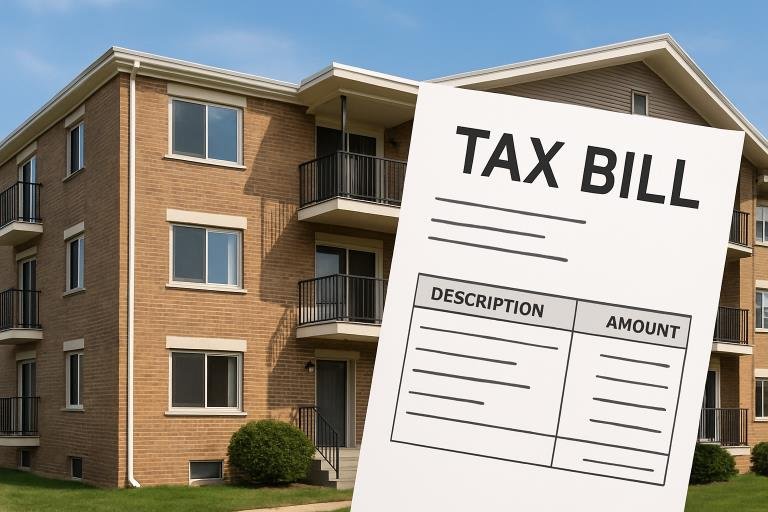Key Takeaways
- Property taxes have a major impact on multi-family investment returns.
- Regularly reviewing and appealing tax assessments can result in significant savings.
- Structured tax strategies, complemented by staying current on regulatory changes, are essential for achieving optimized investment outcomes.
Investing in multi-family real estate can offer steady cash flow and long-term wealth, but understanding the nuances of property taxation is essential for maximizing returns. Property taxes directly impact the profitability of multifamily investments, and over-assessed valuations can significantly reduce net income. Investors who proactively monitor assessments and challenge inaccuracies can safeguard their financial performance. Navigating these appeals requires knowledge of local regulations, property valuation methods, and a clear strategy to present compelling evidence to tax authorities.
Industry professionals with expertise in real estate and taxation can provide valuable guidance throughout this process. For example, insights shared by experts like Charles Nabit LinkedIn highlight practical strategies for managing multi-family tax appeals while optimizing investment outcomes. Leveraging professional advice helps investors make informed decisions, reduce unnecessary tax burdens, and enhance the overall profitability of their multi-family portfolios, ensuring a more secure and strategic approach to real estate investment.
How Property Taxes Affect Multi-Family Investments
Local governments rely on property taxes to fund essential community services, including education, public safety, and infrastructure. For property owners, the tax owed is determined by multiplying a property’s assessed value by the local tax rate. Unfortunately, even a small increase in assessment can represent a significant dollar amount on large-scale, multi-family assets where profit margins are closely guarded. The ability to forecast and control these costs has a direct impact on your net operating income (NOI) and your property’s long-term investment potential.
The Importance of Accurate Property Valuations
Ensuring your property is valued fairly is one of the most effective ways to keep tax bills manageable. In many markets, widespread inaccuracies exist in the assessment process, with properties sometimes appraised at levels far above their actual economic value. For example, following a recent wave of appeals in Chicago, commercial property owners saw their overall share of the city’s tax burden decrease from 49% to 46%, providing a prime case study in the power of organized appeals. Investors who proactively review assessment notices—and appeal when needed—can prevent overpaying year after year. Accurate valuations are especially vital in volatile markets or following substantial renovations, where historical data may not accurately reflect current conditions.
Common Challenges in Property Tax Assessments
- Inaccurate Income Assumptions: Assessors sometimes overestimate potential rental income or disregard rent concessions, inflating values and tax obligations beyond what a property can reasonably support.
- Ignored Deferred Maintenance: Failing to deduct the cost and impact of needed repairs can lead to assessments that don’t match a property’s true condition.
- Underreported Operating Expenses: A lack of consideration for real-world expense increases, like higher insurance rates or maintenance costs, skews the final calculation against owners.
Successful tax appeals frequently hinge on bringing such discrepancies to light, often supported by robust documentation and professional evidence.
The Tax Appeal Process
- Assessment Review: Every appeal starts with a thorough review of the assessment notice to identify any factual errors or inconsistencies.
- Evidence Gathering: Investors gather data from comparable buildings, income and expense reports, and recent appraisals to construct their argument.
- Appeal Submission: Appeals must be filed within periods set by local law, which can vary considerably across states and municipalities.
- Hearing Attendance: In some cases, property owners or their representatives must present their case, complete with supporting materials, to a review board or appeals panel.
Professional property tax consultants or attorneys can add considerable value to this process, particularly for larger or more complex portfolios.
Tax Strategies for Multi-Family Property Owners
- Cost Segregation Studies: These studies break down building components to facilitate accelerated depreciation, lower taxable income, and defer cash outflows.
- Energy Efficiency Credits: Federal incentives, such as the 45L credit for energy-efficient units, add up to real savings for owners who prioritize green upgrades.
- 1031 Exchanges: Investors can defer capital gains taxes by swapping qualifying properties, thereby preserving more capital for future transactions.
Staying Informed on Regulatory Changes
U.S. tax law is not static. Recent reforms, such as raising the cap on a REIT’s ownership of taxable REIT subsidiaries from 20% to 25%, are just one example of how legislative shifts can impact investment structure and operational flexibility. Timely knowledge ensures proper compliance and informs strategies for restructuring portfolios or pursuing future investments.
Ongoing education and regular contact with real estate advisors are invaluable for any investor. Monitoring proposed legislation or IRS rulings can provide a competitive edge, safeguarding you against surprises and equipping you to capitalize on new opportunities.
Conclusion
Effective property tax management forms a cornerstone of multi-family investment success. By mastering the nuances of assessment, proactively appealing inaccuracies, and optimizing tax strategies, investors can reduce costs and bolster returns. As regulations and market conditions shift, maintaining up-to-date knowledge and engaging professional assistance become even more critical. With the right approach, multi-family investors can maximize their property value and steady their portfolio’s future growth.



